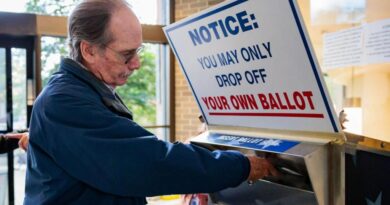Harris’ support fuels racial resentment over reparations

The City Council of New York voted on Thursday to initiate a reparations task force, potentially leading to billions of dollars in taxpayer-funded payouts to compensate for the effects of slavery and previous injustices.
New York City, alongside several other municipalities such as Tulsa, Okla., and Evanston, Ill., as well as three states—California, Illinois, and most recently New York—is considering reparations based on race.
The Democratic Party is advocating for this concept.
At one point, Kamala Harris also supported the idea.
During her 2019 Democratic presidential primary campaign, she endorsed “some form of reparations,” co-sponsored a federal bill to study race-based reparations, and pledged to Rev. Al Sharpton’s National Action Network that, if elected president, she would sign a reparations-study bill into law.
However, her current campaign refuses to disclose her current stance on reparations.
Does she wish for us to be “unburdened by what has been”?
The majority of Americans acknowledge that slavery and Jim Crow were dark chapters in our nation’s history.
However, the current push for race-based reparations at the local, state, and national levels could be problematic.
Instead of fostering unity and reconciliation, it might instigate false hopes of significant payouts and fuel animosities.
Compensating actual victims of historical injustices through reparations is a valid approach.
For example, during World War II, President Ronald Reagan established $20,000 payments for Japanese Americans who were unjustly incarcerated, but solely for the affected individuals, not their descendants.
Similarly, the German government still provides reparations to Holocaust survivors, excluding their descendants.
In contrast, discussions around US race-based reparations typically involve forcing individuals unrelated to slavery to provide compensation to those who were not themselves enslaved.
As New York City Councilman David Carr (R-SI), who opposed the reparations task force, explained, “No current residents in our city are responsible for the evils of slavery, and most New Yorkers are descendants of immigrants who arrived after its abolition.”
The concept of reparations is divisive and could incite genuine anger among those compelled to pay.
In the US, individuals are not held accountable for the transgressions of their predecessors.
Pew Research indicates that 80% of white Americans oppose reparations, while 77% of black Americans support the idea.
City Council Minority Leader Joseph Borelli (R-SI) stated, “I’ll relocate before paying.”
Race-based reparations also contradict the principles of the US Constitution’s 14th Amendment, which ensures equal treatment for all citizens regardless of race.
Evanston has already dispersed $5 million to 203 black residents to address historical housing discrimination.
Eligibility for this restitution is extended to any black individual who resided in Evanston between 1919 and 1969, or their descendants, without proof of specific wrongdoing.
Judicial Watch, a constitutional advocacy organization, is legally challenging this by representing six non-black Evanston residents, arguing that the race-based disbursements are merely a tactic to allocate tax revenue along racial lines.
Primarily, the aim is not to compensate actual victims of slavery and bias but to engage in social engineering by excessively promoting equity.
Linda Bilme and Cornell William Brooks from Harvard’s Kennedy School, advocates for reparations, suggest that these payments are necessary to address wealth disparities between white and black individuals.
Advocates for reparations in Tulsa propose providing cash payments to black residents due to the significantly higher average household income of white residents.
Instead of implementing a confiscatory reparations program, why not consider a job creation initiative?
During the initial meeting of the state’s Community Commission on Reparations, New School professor Darrick Hamilton seemed to focus on narrowing the racial wealth gap.
“The substantial inequalities we observe today are not due to incompetent individuals,” Hamilton stated.
Therefore, New Yorkers should be cautious about potential financial repercussions.
Equalizing the racial wealth gap through redistribution is not a legitimate role for the government.
Moreover, state and local resources may not suffice for such reparations.
San Francisco’s proposed a one-time $5 million payment to each black resident, aimed at reducing wealth inequalities, was deemed unsustainable.
Economist William Darity advocates for Congress to allocate the estimated $12 trillion required to address the national racial wealth gap, as states and cities may not have the financial capacity to do so.
The Democratic Party’s platform, revised on Aug. 16, urges Congress to explore federal reparations payouts through legislation.
It remains uncertain whether a President Kamala Harris would enact reparations legislation.
Clarity on this matter is essential.
Betsy McCaughey is a former lieutenant governor of New York.



